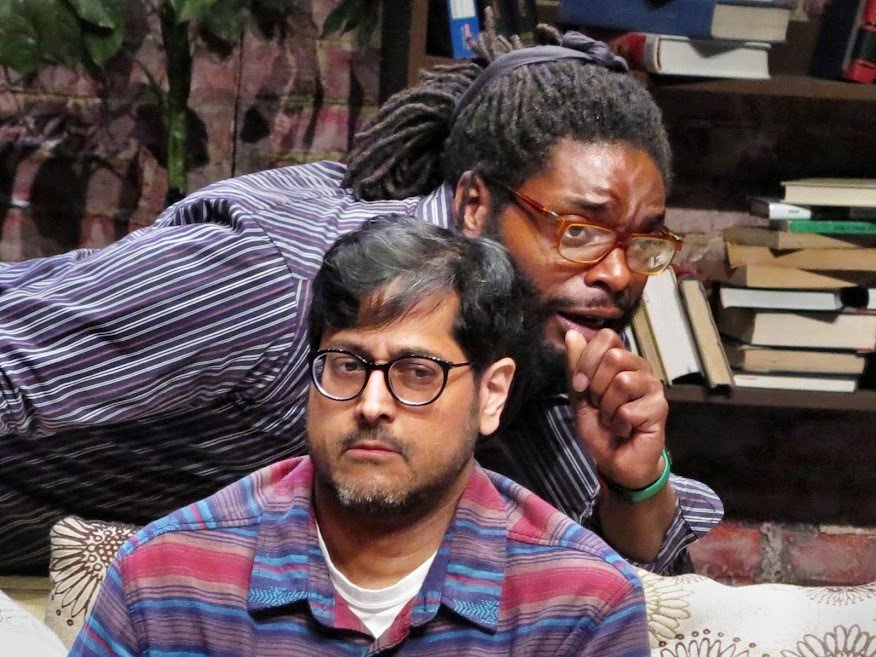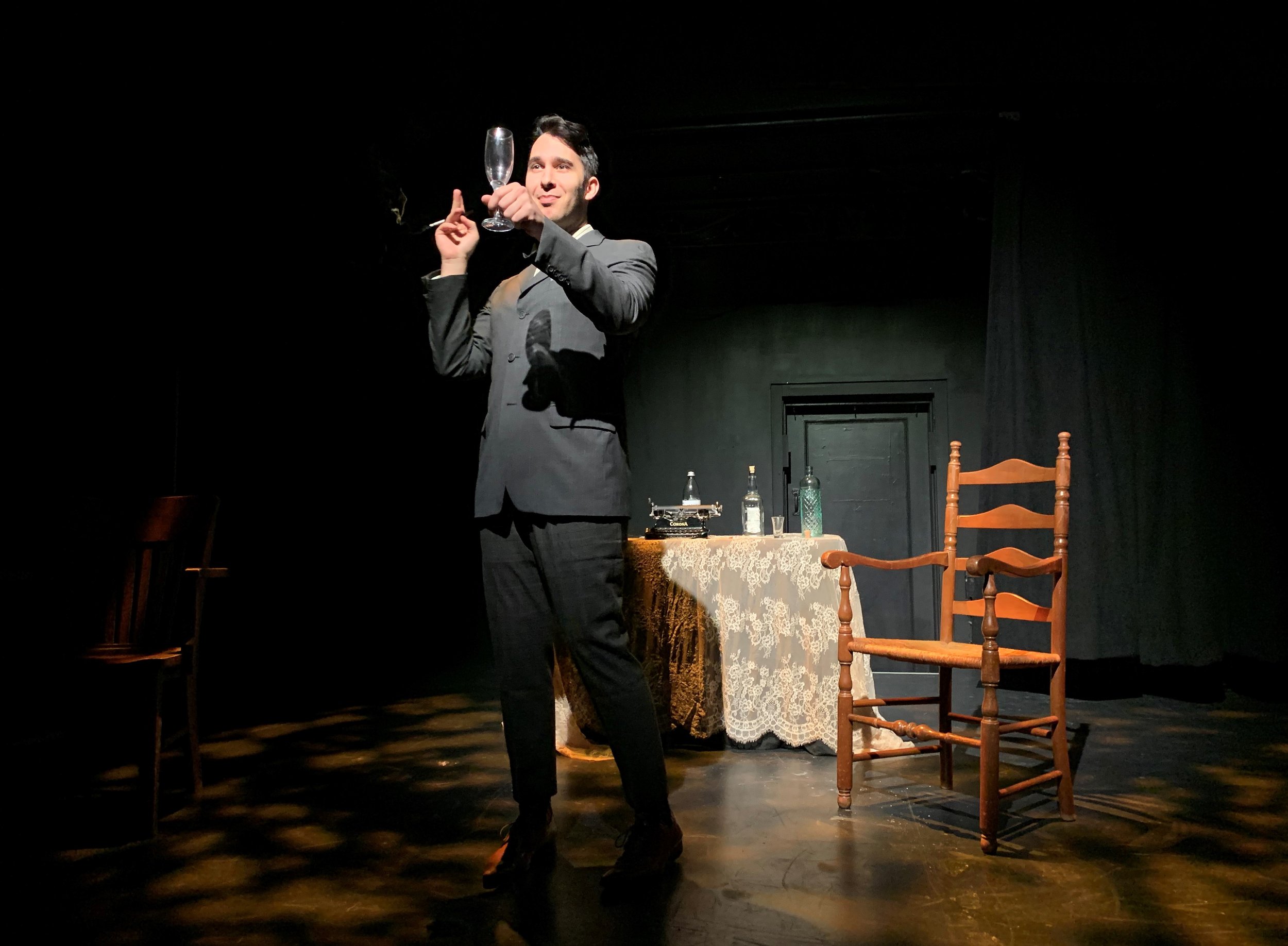Michael Dale’s Theatre Crawl – Ishmael Reed Envisions A New Underground Railroad In The Conductor
Imran Javaid and Brian Simmons in The Conductor (Photo: Jonathan Slaff)
by Michael Dale
This week…
The Conductor at Theater For The New City through March 26. Tickets $18, Students/Seniors $15.
Tennessee Rising: The Dawn of Tennessee Williams at AMT Theater through April 2. Tickets $35/$45.
While I won’t try to pass myself off as a close friend of John McWhorter,…
…the Columbia linguistics professor and author who is frequently seen on political talk shows discussing issues regarding Black Americans, I do have fond memories of discussing our favorite flop musicals with him at Marie’s Crisis and enjoying his pleasant baritone voice in a cabaret show at Cornelia Street Café. A particularly clever bit of his was a Tower of Babel rendition of “Why Can’t The English?”.
It's been many years since I’ve seen him last, and while I greatly admire his view that Onna White’s choreography of the title song of the 1964 Broadway musical I Had A Ball represents a healthy blue-collar assimilation of the dance language of diverse cultures into the white mainstream, I’ll recognize that the self-described “cranky liberal” has expressed other opinions that have been regarded as controversial among numerous Black Americans.
Among his critics is Ishmael Reed, the celebrated 85-year-old author known for taking a satirical approach to social commentary. A few years ago, at the Nuyorican Poets Café, his Dickens-like play, The Haunting of Lin-Manuel Miranda, had the title character, under the influence of Ambien, dreaming of being visited by the spirits of American historical figures accusing him of whitewashing the story of Alexander Hamilton.
In The Conductor, now receiving a fine production from director Carla Blank at Theater For The New City, his main character has a couple of inflammatory things to say about McWhorter that a bit of post-show Googling shows reflects opinions the playwright himself has expressed.
But aside from the jabs at my old showtune-singing buddy, I did enjoy Reed’s play and was always interested in what the characters had to say. It reminded me a lot of episodes of All In The Family, where characters would often speak in political talking points.
The apparent playwright’s voice here is a Black newspaper columnist named Warren Chipp, played with fervent authority and cynical humor by Brian Simmons. In a plot inspired by recent events involving a San Francisco School Board recall, Chipp is suing the paper that fired him after he voiced support for a lottery system which would allow lower-income students an equal chance for enrollment in the community’s elite school, replacing what he regards as a racist test-based admissions system that puts Black and Latino students at a disadvantage.
As reported by Hedda “Buttermilk” Duckbill (Laura Robards), the smarmy, editorializing news anchor of television’s White Lightning Network (“Hats off to the Star-Spangled Boys, patriots who disrupted a Gay Pride parade.”), Shashi Parmar (Imran Javaid), an activist of Indian descent who was a spokesperson for the organization that led the campaign to oust lottery-supporting school board members, is now on the run after being accused of supporting India’s new radically anti-American prime minister.
With a rise in anti-Indian prejudice and air travel between the two countries discontinued, Black Americans like Chipp have set up a new underground railroad to hide people of Indian descent and have them transported to Canada.
When Parmer arrives at Chipp’s door seeking refuge, his political opponent is happy to oblige (“We Blacks love everybody but each other. We just about invented forgiveness.”) but the price of Parmer’s safety is to listen to the journalist’s accusation that his support of test-based admissions is just another example of his people wishing to be seen as a “model minority.”
“Minorities make alliances with us until their admission into the white club is accepted,” explains Chipp. “This happened to the Jews, the Japanese, the Irish, the Italians, and now you guys.”
A colleague of Chipp (Kenya Wilson) arrives with news of a payout to support a racist bail system. The inclusion of Parmer’s sister (Monisha Shiva) introduces issues of interracial marriage and the subjugation of women, and late in the proceedings, a White Lightning commentator of Pacific Island descent (Gabriel Noitallde) promotes an “English Only” movement.
As someone who can check all the privilege boxes, it’s not my place to comment on the themes in The Conductor, but one of the things I’m trying to accomplish with this column is to encourage people like me to take advantage of the increased diversity of representation and viewpoints offered at affordable prices in Off-Off Broadway and indie theatre. Certainly there’s no one opinion within any group, but throughout The Conductor I noticed audience members in my sightline frequently nodding their heads in approval and those within earshot often voicing vocal agreement,
I do feel qualified to take issue with Reed on one brief moment in the play, when Chipp’s statement that Cole Porter praises Mussolini in the lyric of his 1934 Anything Goes hit, “You’re The Top” goes unchallenged. As musical theatre scholars have noted (and I suspect John McWhorter would agree), replacing “You’re an O’Neill drama / You’re Whistler’s mama” with “You’re Mussolini / You’re Mrs. Sweeney” was most likely the work of P.G. Wodehouse, who revised the script’s American topical references for the 1935 West End production, sung here by stars Jeanne Aubert and Jack Whiting.
There are two things I fear about sitting in the front row of a theatre…
The first one is spit.
I write this with honest compassion, remembering how I’ve inadvertently sprayed some scene partners and audience members during my days as an actor, but every so often I’m sitting up close and either I or someone near me gets hit with a droplet or two.
The most extreme example I’ve witnessed was at a solo play on Broadway where the star was staged front and center, addressing the crowd directly, for nearly the whole show. From my front row, extreme side seat, I could continually see bits of saliva gracefully arcing from the actor’s mouth throughout the first act, and two audience members directly below using their open Playbills to shield their faces below the eyes. Their seats were empty for act two.
My second fear is one that developed after I started writing about theatre, and it’s that an actor will spot me writing something in my notebook during a performance. Like many theatre journalists, I’ll have a pen and a bit of paper ready once the lights go down, wanting jot down reminders of things that strike us, though in my case I can rarely decipher the scribbles I make in the darkness.
There was no notetaking nor spitting involved when I was assigned a front row seat for playwright/performer Jacob Storms’ absolutely delightful solo venture Tennessee Rising: The Dawn of Tennessee Williams, and so captivated was I with the warm intimacy of director Alan Cumming’s simple, but effective production that I often felt privy to a private visit with the master of Southern Gothic playwrighting. (But my guest confirmed that I wasn’t the only recipient of the actor’s eye contact.)
Jacob Storms in Tennessee Rising: The Dawn of Tennessee Williams (Photo: Max Ruby)
The play rather appropriately opens and closes with a toast to the kindness of strangers, and throughout the 75-minute performance, mentions of a glass menagerie, a fellow named Stanley Kowalski and a woman known to her intimates as Maggie The Cat reinforce the autobiographical nature of the artist’s catalog.
This is especially noticeable when, at the play’s outset, with our hero lounging comfortably in the French Quarter shortly after the great success of his debut Broadway effort, he reminisces back to the time he changed his first name (Tom) and lied about his age to enter a young playwrights contest held by The Group Theatre.
The stories of love, lust, brain disease and bad casting that lead up to his overnight stardom are told with a lyrical lilt in a performance that never dotes too dramatically on personal issues, as if our host wouldn’t dream of upsetting his guests with gloomy recounts of such minor inconveniences. This is a Tennessee Williams that very kindly treats strangers as welcome guests.
Curtain Line…
When South Pacific opened on Broadway in 1949, its most controversial song was “Carefully Taught”. In 2023, its most controversial song is “Honey Bun”.

